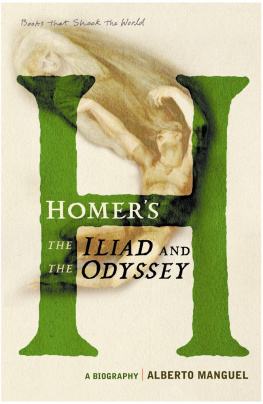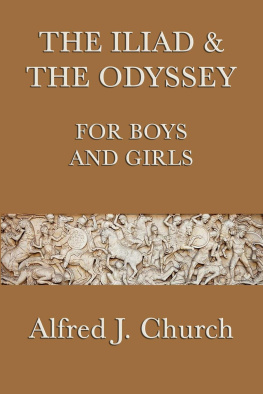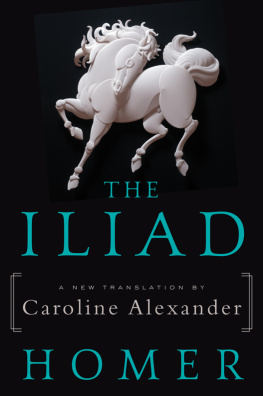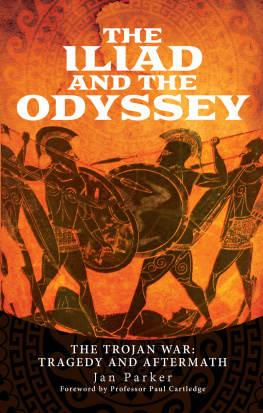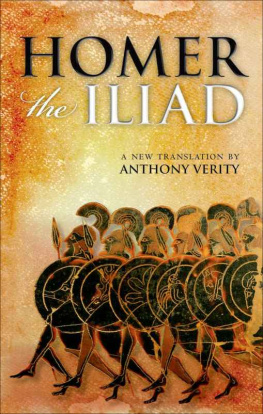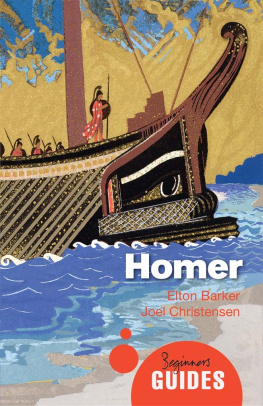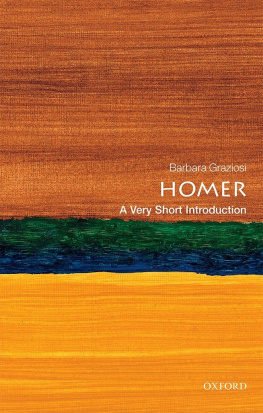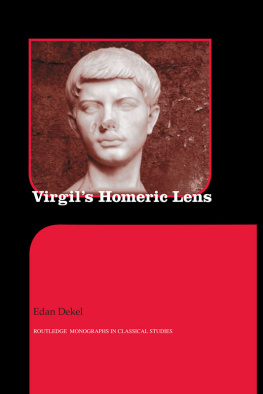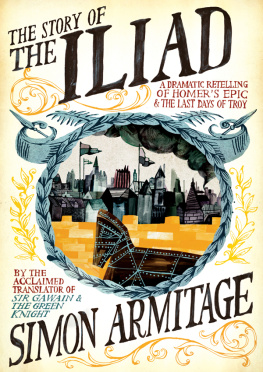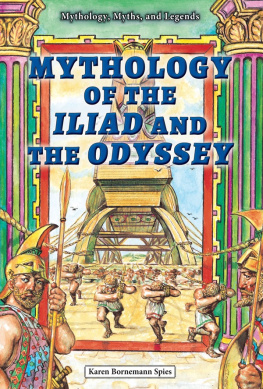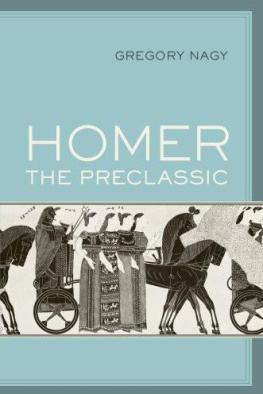Homers The Iliad and The Odyssey
A Biography
Alberto Manguel is a world-renowned writer, translator and editor of literary anthologies. His works include A History of Reading, published in 1997 and his novel, Stevenson Under the Palm Trees, in 2005.
Other titles in the Books That Shook the World series:
AVAILABLE NOW:
The Bible by Karen Armstrong
Platos Republic by Simon Blackburn
Darwins Origin of Species by Janet Browne
Thomas Paines Rights of Man by Christopher Hitchens
The Quran by Bruce Lawrence
On the Wealth of Nations by P. J. ORourke
Carl von Clausewitzs On War by Hew Strachan
Marxs Das Kapital by Francis Wheen
FORTHCOMING:
Machiavellis The Prince by Philip Bobbitt

To Craig, in Ithaca
First published in hardback in Great Britain in 2007 by Atlantic Books,
an imprint of Grove Atlantic Ltd.
This paperback edition published in Great Britain in 2008 by Atlantic Books.
Copyright Alberto Manguel 2007
The moral right of Alberto Manguel to be identified as the author of this work has been asserted in accordance with the Copyright, Designs and Patents Act of 1988.
All rights reserved. No part of this publication may be reproduced, stored in a retrieval system, or transmitted in any form or by any means, electronic, mechanical, photocopying, recording, or otherwise, without the prior permission of both the copyright owner and the above publisher of this book.
Every effort has been made to trace or contact all copyright-holders. The publishers will be pleased to make good any omissions or rectify any mistakes brought to their attention at the earliest opportunity.
1 3 5 7 9 8 6 4 2
A CIP catalogue record for this book is available from the British Library
ISBN 978 1 84354 403 6
eISBN 978 1 78239 139 5
Designed by Richard Marston
Typeset by Avon DataSet Ltd, Bidford on Avon, Warwickshire
Printed in Great Britain
Atlantic Books
An imprint of Grove Atlantic Ltd
Ormond House
2627 Boswell Street
London WC1N 3JZ
www.atlantic-books.co.uk
ACKNOWLEDGEMENTS
Several readers have helped me in my research: Antonio Basanta Reyes, Carmen Criado, Silvia Di Segni Obiols, Lucie Pabel, Gottwalt Pankow, Arturo Ramoneda, Marta Royo, Jean-Christophe Saladin, Guillermo Schavelzon, Takis Thodoropoulos, Mario Claudio Vicario: to them my deepest thanks. Special thanks to Louisa Joyner for her care, patience and enthusiasm, and to Meg Davies for her precise and intelligent indexing. Also, to Toby Mundy of Grove Atlantic for suggesting the book in the first place, and to Bruce Westwood and the staff of WCA, who were the first enthusiastic emissaries.
A NOTE ON TRANSLATIONS AND EDITIONS
To simplify the reading, Ive preferred to use common versions of the Homeric names, Ulysses rather than Odysseus and Achilles rather than Akhilleus. As Samuel Butler noted, Neither do I think that Hekabe will supersede Hecuba, till Whats Hecuba to him or he to Hecuba? is out of date. (Though in our forgetful times, Butler may have to wait less time than he thought)
I am aware that I use the term Greek incorrectly. The allied forces against Troy were composed of Achaeans, Danaans and Argives, not of homogenous Greeks, a name that was not invented until the expansion of the Roman Empire. However, in the context of this book, I use Greek as a kind of shorthand. Neither does the word Hellenic (which I have used once or twice) properly cover the historical and geographical ground of Homers stories, only a limited territory in southern Thessaly.
The numbering of Homers lines differs in the various translations. Throughout the book, I have used the versions of the Iliad and the Odyssey translated by Robert Fagles and published in 1992 and 2004 respectively by Penguin Classics, which, to my taste, are among the best and most graceful. Other translations of foreign works quoted, unless otherwise stated, are my own.
Concerning the task of a literary critic, A. E. Housman had this to say: Knowledge is good, method is good, but one thing beyond all others is necessary; and that is to have a head, not a pumpkin, on your shoulders, and brains, not pudding, in your head. I have long had occasion to doubt whether I fulfil either requirement.
Alberto Manguel
Mondion
August 2006
INTRODUCTION
Every great work of literature is either the Iliad or the Odyssey.
Raymond Queneau, Preface to Flauberts
Bouvard et Pcuchet, 1947
It seems fitting that the two books which, more than any others, have fed the imagination of the Western world for over two and a half millennia, should have no clear starting-point and no identifiable creator. Homer begins long before Homer. In all probability, the Iliad and the Odyssey drifted into being gradually, indefinably, more like popular myths than formal literary productions, through the untraceable process of ancient ballads sifting and blending until acquiring a coherent narrative shape, ballads sung in tongues that were already archaic when the poet (or poets) whom tradition agreed to call Homer was at work in the eighth century BC . For many centuries, the poor, blind singer begging his way through ancient Greece was generally regarded as the author of the Iliad and the Odyssey; in time, he came to be replaced by a kind of inspired spirit, part fable and part allegory, the ghost of Poetry
We dont know anything about Homer. It is otherwise with Homers books. In a very real sense, the Iliad and the Odyssey are familiar to us prior to opening the first page. Even before we begin to follow the changing moods of Achilles or admire the wit and courage of Ulysses, we have learned to expect that somewhere in these stories of war in time and travel in space we will be told the experience of every human struggle and every human displacement. Two of our oldest metaphors tell us that all life is a battle and that all life is a journey; whether the Iliad and the Odyssey drew on this knowledge or whether this knowledge was drawn from the Iliad and the Odyssey is, in the final count, unimportant, since a book and its readers are both mirrors that reflect one another endlessly. Whatever their nebulous origins, most scholars now assume that the poems ascribed to Homer began as scattered compositions of various kinds that eventually coalesced and became perfectly interwoven to form the two lengthy stories we now know: one describing the tragedy of a single place, Troy, which is fought over by many men; the other telling the homecoming adventures of a single man, Ulysses, who makes his way back through many dangerous places. For Homers future readers, Troy came to stand for all cities and Ulysses for every man.
Homer and his works belong to the former category, but there have been times in their long history when readers chose to consign them to the latter.
No one owns Homer, not even the best of his readers. Each one of our readings is done through layers of previous ones that pile upon the page like seams in a rock until the original text (if there ever was so pure a thing) is hardly visible. So that when we think, upon closing Homer, Ah, now Ive made the Iliad or the Odyssey mine! what we mean is that weve made ours a story that many others have long annotated, recast, interpreted, adapted, and that, with their testimonies echoing more or less loudly in our ears, weve tried to impose our tastes and prejudices upon a cacophony of one-man bands, like Keats first looking into Chapmans Homer or Joyce hustling Ulysses through the crowded streets of Dublin. In this attempt, strict adherence to official chronologies isnt useful: readings influence one another back and forth across time, and we mustnt accuse St Augustine of anachronism for studying Homer under Goethes guidance, or Heraclitus for allowing himself to be prejudiced by the commentaries of George Steiner.
Next page
